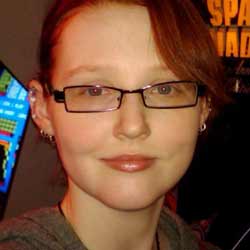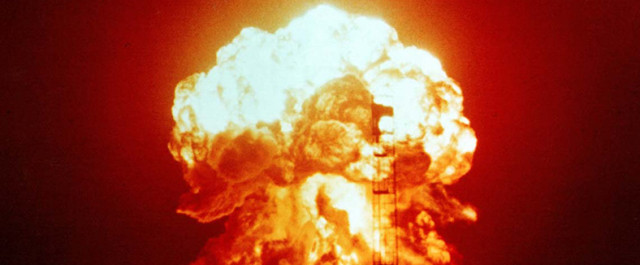Kristi Hébert
Dystopian fiction is not simply about the end of the world. It is often defined as “A futuristic, imagined universe in which oppressive societal control and the illusion of a perfect society are maintained through corporate, bureaucratic, technological, moral, or totalitarian control. Dystopias, through an exaggerated worst-case scenario, make a criticism about a current trend, societal norm, or political system” (ReadWriteThink). In essence, dystopian fiction is not just a genre designed to terrify the world with what might have been or what will be, but a more sincere social criticism, and while literary fiction is a form that requires a writer to focus on meaning and artistic prowess rather than the entertainment value of the piece, dystopian fiction is often relegated to mere genre fiction—a subsection of novels meant for pure entertainment with little to no literary merit.
However, there are many craft lessons to be learned from genre fiction in and of itself, and specifically dystopian fiction. While dystopian fiction may be entertaining, or fantastical, or within the realm of science fiction, it also focuses on dispossessed or marginalized people, and the politics of how the suppression of an entire culture of society occurs with the apparent permission of the general populace. Dystopian fiction is a way for writers to examine the possibility for vast social change, often as a warning based on the social and political climate in which they are writing, while weaving a thread of utopian hope as a subtext throughout the novel. These writers reject the notion that immense societal, economic, or political changes are impossible, while offering their protagonists a chance to unveil change from within the society that is oppressing him or her and thereby offering the writer as well as the reader a chance to see the society they are reflecting upon beginning to change as well.
To that end, one of the most powerful tools that an author can use is, of course, language. However, it is not merely the act of writing that the dystopian novel can teach us. When an author evokes setting through language, it can anchor a reader in a time and place that the reader is unfamiliar with, without explicitly stating that the setting is another world or time. It eases a reader into the world of dystopia without offering too much information that would reduce the likelihood of a reader’s suspension of disbelief. Furthermore, in both fiction and non-fiction, as well as in real life, language itself is often used as a tool of power by totalitarian regimes or authoritarian governments: to take away an individual’s power to learn, to gather information for his or herself, to speak a language or use words native to his or her tongue, or to disagree with the politics or beliefs of his or her time is to take away personal agency, creating a prison of language, rather than bars.
Cognitive estrangement—or the act of using a reader’s lack of knowledge in the fictive world he or she is reading to continue a suspension of disbelief—is a theory often applied to works in which the audience must be willing to believe a premise in fiction that they would never believe in the “real world.” A dystopian text often begins by plunging the reader into the created world with no preamble or introduction; yet cognitive estrangement is often delayed by the sense of normalcy that is created by this lack of preliminary explanation. It is the language, then, that portrays to the reader that all is not what it seems. Either by the author him- or herself using their craft of language to portray a different world or time, or by the text itself having an official discourse of a dystopian power structure, language is often the key element in dystopian fiction.
The way in which language is applied to dystopian fiction can be of assistance to writers of all kinds, not just science fiction or other genres. As an author, one of the most important decisions you can make is regarding word choice. If the words are beautiful but meaningless, or the meaning is hidden behind an amalgam of confusing text, a writer has accomplished nothing but frustrating herself and her potential readers. As a professor, using words that are well-understood by the general student body, but also convey the meaning of intellectual pursuits, is an essential skill. Likewise, in dystopian fiction, word choice can convey more than beautiful sentences or pretty ideals. In 1984, Orwell begins the novel with “It was a bright cold day in April, and the clocks were striking thirteen.” With one word—thirteen—the reader understands that something is different about this place. If one is to create that fragile suspension of disbelief in a world where our laws of physics are broken, or there are strange rules and terrifying laws, or a nuclear holocaust has occurred, it is essential to ease the reader into the muck. In dystopia, the author drops the reader into the world without explanation of how things got as bad as they did, but without an initial sense of normality, it is often too surreal to be believed.
Dystopian fiction has many craft elements that are not often seen through the veneer of entertainment that plagues the genre. While zombies, viruses and nuclear holocausts are often the background of dystopian worlds, it is not the focus of the writing. Dystopian authors must also have a fine control of their craft in order to properly frame the world in such a way that skeptical readers can overcome their hesitation. Each sentence must be carefully thought out to provide meaningful beauty, lest the reader give up on the genre as childish fiction. Writers of dystopia must work harder to make their pieces true literature, and it is only by focusing on the words and the language, whether it is displayed as the power of the author, protagonist, or regime, that dystopian fiction will prevail.
 Kristi Hébert was born near Buffalo, NY, but she now lives in a mosquito-ridden bayou jungle in Louisiana. She works as a dog trainer, for which she didn’t need any of her three degrees. She’s currently getting a fourth degree just for fun. She likes to write about the end of the world, and she has been mistaken for Ariel, the Little Mermaid, at least once. She is the Blog Editor of South 85 Journal.
Kristi Hébert was born near Buffalo, NY, but she now lives in a mosquito-ridden bayou jungle in Louisiana. She works as a dog trainer, for which she didn’t need any of her three degrees. She’s currently getting a fourth degree just for fun. She likes to write about the end of the world, and she has been mistaken for Ariel, the Little Mermaid, at least once. She is the Blog Editor of South 85 Journal.
Featured Image Credit: Photo courtesy of National Nuclear Security Administration / Nevada Site Office [Public domain], via Wikimedia Commons
